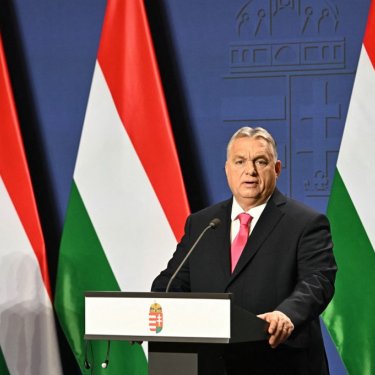Hungary’s sovereignty law is Viktor Orban’s new dangerous provocation targeting independent media

Just as the European Union (EU) is reaching agreement on an unprecedented European Media Freedom Act, Hungary’s ruling party, Fidesz, has engineered a new assault on the country’s few remaining independent media. In the light of its new “sovereignty protection" law, Reporters Without Borders (RSF) calls on EU institutions to relaunch the sanctions procedure against Hungary for rule of law violations.
Only recently passed by parliament, the National Sovereignty Protection Act was promulgated by Hungarian President Katalin Novak yesterday (20 December), despite the damning evaluation issued jointly a week earlier by ten Hungarian media outlets, which said the law “is capable of severely restricting the freedom of the press, potentially making it difficult or even impossible for independent newsrooms, journalists and media companies to operate.”
The "Sovereignty Protection Authority" created by the new law will comply with Hungary’s Basic Law and will have no impact on press freedom, President Novak insisted. But the head of the prime minister’s office, Gergely Gulyas, has said the “organisations” referred to vaguely in the new law include media outlets. And Mate Kocsis, the Fidesz faction leader in the parliament who proposed the law, said in September that, among others, he wanted to target “left-wing journalists (...) serving the interests of American democratic dollar billionaires or multinationals in Brussels.”
Under the new law, independent media outlets that receive foreign funding, including from the EU, could be officially labelled as “foreign agents,” which would expose them to more government smear campaigns. But international funding is essential for many independent media - often with the status of non-governmental organisations - which are denied state advertising and are harassed by the media regulator.
With no provision for legal recourse against its decisions, the "Sovereignty Protection Authority" will be free to request information from any media outlet about its financing and its activities, and to conduct investigations into its reporting, in cooperation with the police and intelligence agencies. Furthermore, although Hungarian media law safeguards the confidentiality of journalists’ sources, this protection could be circumvented by this new authority, which is anchored in Hungary’s Basic Law and therefore freed from the constraints of its media legislation. Under the pretext of an investigation into its financing, the authority could put pressure on a media outlet to reveal its sources.
This new law runs counter to the progress achieved in the European Media Freedom Act, on which the EU’s institutions reached an agreement on 15 December despite strong opposition from the Hungarian government and despite attempts by other countries to weaken it.
“Just as the EU’s institutions are reaching agreement on unprecedented European press freedom legislation, Hungary’s ruling party, Fidesz, is engineering an attack on the remaining independent voices in a media landscape of which it already controls 80%. The sovereignty protection law is a new, dangerous provocation by Prime Minister Viktor Orbán. We call on the Council of the EU and the European Parliament to firmly relaunch the sanctions procedure against Hungary for rule of law violations under Article 7 of the Treaty on European Union.
Hungary is ranked 72nd out of 180 countries in RSF's 2023 World Press Freedom Index, and its prime minister is on RSF’s list of 37 press freedom predators.
